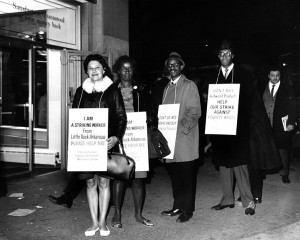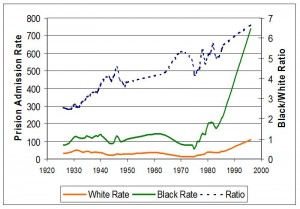
African American and Hispanic American workers on strike against Kellwood, wearing placards that encourage support for better wages
The staunchest and most consistent opponents of systemic racism are situated on the left, and a great many of them have been explicitly socialists. Socialists were some of the first to seriously champion the causes of anti-racism as it fits naturally into the scope of an egalitarian world view.
Yet it is not only socialism which can adopt anti-racism. Liberal democratic societies do not need to have laws relegating one ethnic group or people of certain skin colours to a different legal structure. Democracies are quite capable of conceding full legal equality as was finally realised by African Americans in the civil rights movement.
The end of the civil rights movement was in some way the rise of a more advanced form of capitalism. A capitalism that was really starting to make true on its promise of a complete formal civil equality. We can see the movement has continued in this direction even to the present day, and we will surely see LGBT civil rights become the norm in our lifetime.
Yet for many, and for African Americans in particular, this story is belying one which is somehow more sinister. The facts on the ground paint a fairly dire picture for the average African American.
By the 1980s the incarceration rate for African Americans began to climb precipitously. This climb has to also be seen in the context of a wage stagnation that has been occurring since the early 80s. This correlation is no mere accident. This was precisely the turning point in the battle between labour and capital where labour began to lose decisively. The unions have been in a state of near permanent retreat since the beginning of the 1980s.
All workers benefit from unions, but there is substantial evidence that African American workers benefit even more than their white peers 1. While unions have had an uneasy relationship with race over their history in the United States, they have, on the whole, been more progressive structurally.
All of this structural decline in the position of African Americans is in the context of an almost completely constant reduction in the expression of racist attitudes since the 1960s 2. White respondents have substantially curbed (at least expressed) racist sentiment on every measure from innate capacity to the desirability of intermarriage.
This is creating an extremely strained relationship between reality and discourse. Anti-racism may be making us less inclined to use racial epithets, but structurally what good is it? Poverty tends to generate the conditions for crime, leading those who are impoverished to deal drugs or turn to theft. That this is occurring strongly on racial lines will reinforce racist attitudes. To stop this dangerous cycle we need to get at the root of the problem.
The root of this problem is economic, and the solution is return to a class based approach the alleviation of structural racism. Class based approaches are about working together on the basis of an egalitarian commonality. It removes fault lines that the bosses can exploit. It moves us forward towards a movement against capital, rather than turned inwardly on ourselves.
This is in contrast to viewing the problem as primarily one of racist discourse. Anti-racism presupposes racial sentiment as the critical category. But the critical category should be our common needs of economic and social justice distributed on an equitable basis. While skin colour will not disappear any more than blonds and brunettes are made uniform amongst white workers, it should cease to be a critical category when the difference is reduced to colour rather than manifestation as a structural inequality.
Some will complain that this picture tries to pretend that racism does not exist in the hopes that it will go away. Even if this were true, structurally, the class based approach was working better at practical emancipation and in contrast the race-discourse focused approach is failing on an epic scale. What good is sentimental anti-racism if it does virtually nothing to overcome structural economic and social injustice?
African Americans do not need mere politeness. Neither is the formal legal equality sufficient even though it is necessary. They need social justice and, primarily, in our current situation, economic justice. Anti-racism simply is not achieving real material benefits and historically it has been class based institutions which have made real substantial improvements. Instead of a greater insistence on a subjective anti-racism, we need a return to class politics.











